A coherent parallel beam of microwaves of wavelength λ=0.5mm falls on aYoung's double- slit apparatus. The separation between the slits is 1.0 mm. The intensity of microwaves is measured on a screen placed parallel to the plane of the slits at a distance of 1.0 m from it as shown in Fig. 2.42.
If the incident beam makes an angle or 30∘ with the x-axis (as in the dotted arrow shown in the figure), find the y-coordinates of the first minima on either side of the central maximum.
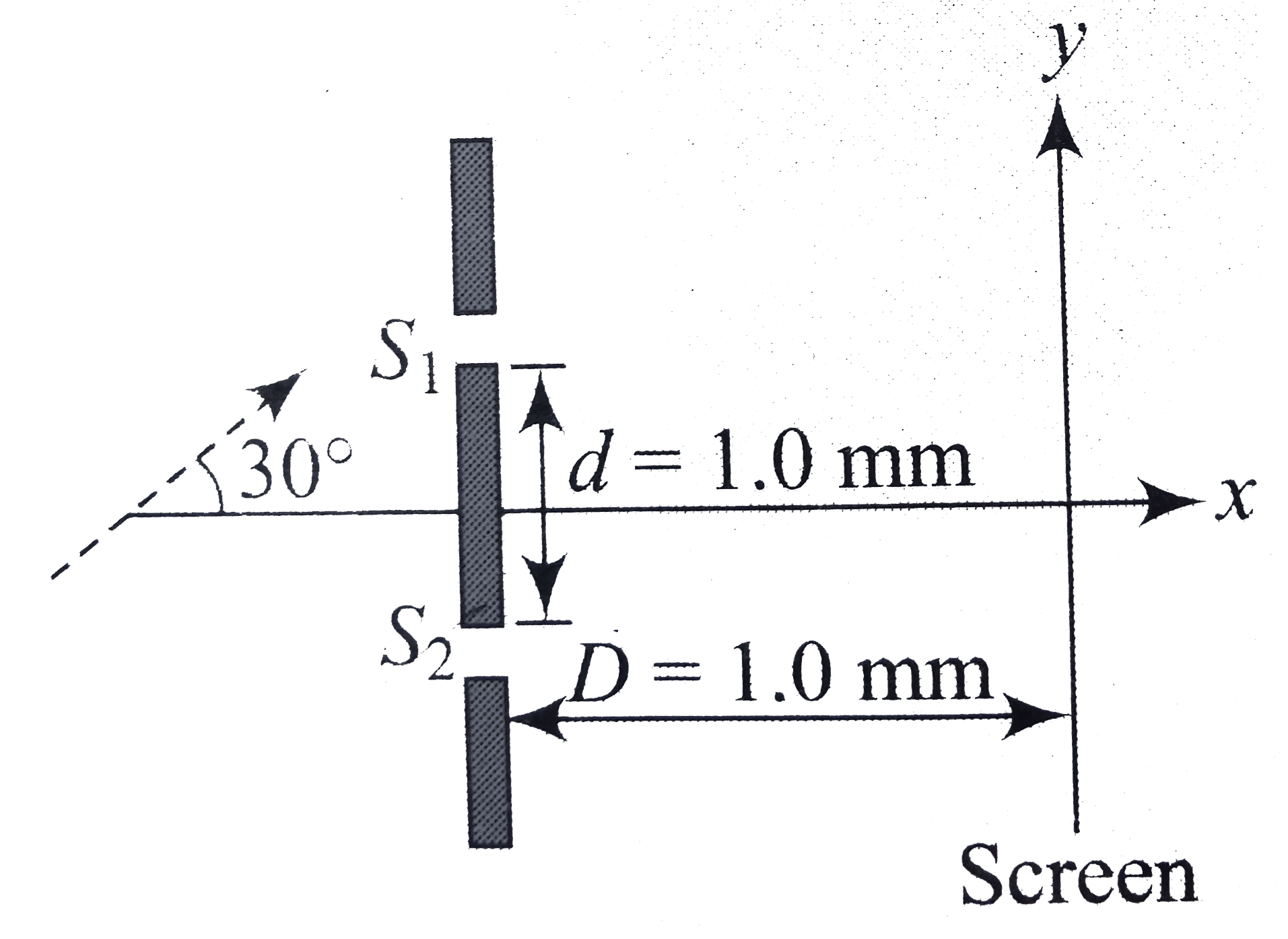
The correct Answer is:A, B, C
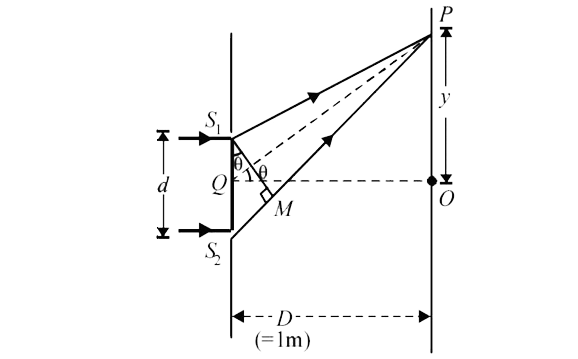
(a) The path difference (△x) from the ray starting from S1 and S2 and reaching a point P will be
△x=dsinθ
We know that the path difference for minimum intensity is
(2m−)(lamda)/(2)wherem=1,2,3…<br>:'dsintheta=(2m-1)(lamda)/(2)<br>impliessintheta=((2m-1)lamda)/(2xx1.0)=((2m-1)0.5)/(2xx1.0)=(2m-1)/(4)<br>Also-1lesinthetale1.Therefore,possib≤valuesofmare+-1,+-2,0<br>FromtrianglePOQ<br>±y=Dtantheta=(Dsintheta)/(sqrt(1-sin^(2)theta))...(i)<br>Positionsofminima<br>Form=+1,sintheta(1)/(4)andy=0.26<br>m=-1,sintheta=-(3)/(4)andy=-1.13m<br>m=+2,sintheta=(3)/(4):'y=+1.13m<br>m=0,sintheta=-(1)/(4):'y=-0.26m(b)WHENTHEINCIDENTBEAMMAKESANANGLEOF30^(CIRC)WITHX−AXIS<br>Twocasesariseasshownbythefollow∈gtwo∈≥s.<br>Pathd⇔erencebetweenray1and2reaχngP=S_(2)M-NS_(1)<br>:'trianglex_(1)=dsintheta-dsinalpha...(Case1)<br>Pathd⇔erencebetweenray1and2reaχngP=NS_(1)+S_(1)M<br>trianglex_(2)=disinalpha+dsintheta....(Case2)<br>PositionofCentralmaxima:Pathd⇔erenceshod––bezer⊙Thereforetrianglex_(1)=0ortrianglex_(2)=0<br>impliesdsinalpha=dsintheta<br>impliessintheta=(1)/(2)[:'a=30∘]<br>Fromequation(i),y=0.58m<br>forfirstminima,dsintheta+dsinalpha=(lamda)/(2)<br>impliesdsintheta=(lamda)/(2)+dsinalpha<br>:'sintheta=(lamda)/(2d)+sinalpha=(0.5)/(2xx1)+sin30^circ=(1)/(4)+(1)/(2)=(3)/(4)<br>Fromequation(i),y=1.15m<br>Forfirstminimaontheothers<br>N119dsinalpha+dsintheta=(lamda)/(2)impliessintheta=(-1)/(4)<br>:'From(i),y=-0.26m
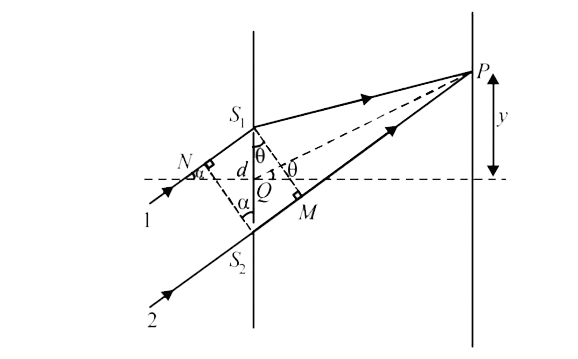
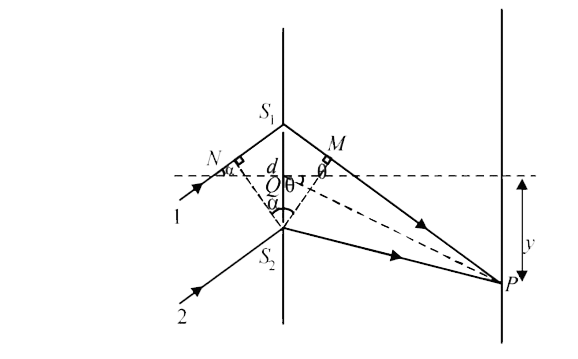
Topper's Solved these Questions
Similar Questions
A coherent parallel beam of microwaves of wavelength A = 0.5 mm fails on a Young's double slit apparatus. The separation between maxima is measured on a screen placed paraiiei to the plane, of the slits at a distance of 1.0 m from it as shown in figtird. The separation between the slits is 2d - 1mm.
(a) If the incident beam fails normally on the double slit apparatus, find the y-coordinates of all the interface minima of the screen.
(b) If the incident beam makes an angle of 30° with the x-axis (as shown in fig. find the y-coordinates of the first minima on either side of the central maximum.
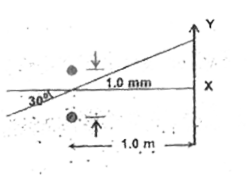
View SolutionA parallel beam of monochromatic light is used in a Young's double slit experiment. The slits are separated by a distance d and the screen is placed parallel to the plane of the slits. Show that if the incident beam makes an angle θ=sin−1(λ2d) with the normal to the plane of the slits, there will be a dark fringe at the centre Po of the pattern.
View Solution
Knowledge Check
A coherent parallel beam of microwaves of wavelength λ=0.5mm falls on aYoung's double- slit apparatus. The separation between the slits is 1.0 mm. The intensity of microwaves is measured on a screen placed parallel to the plane of the slits at a distance of 1.0 m from it as shown in figure
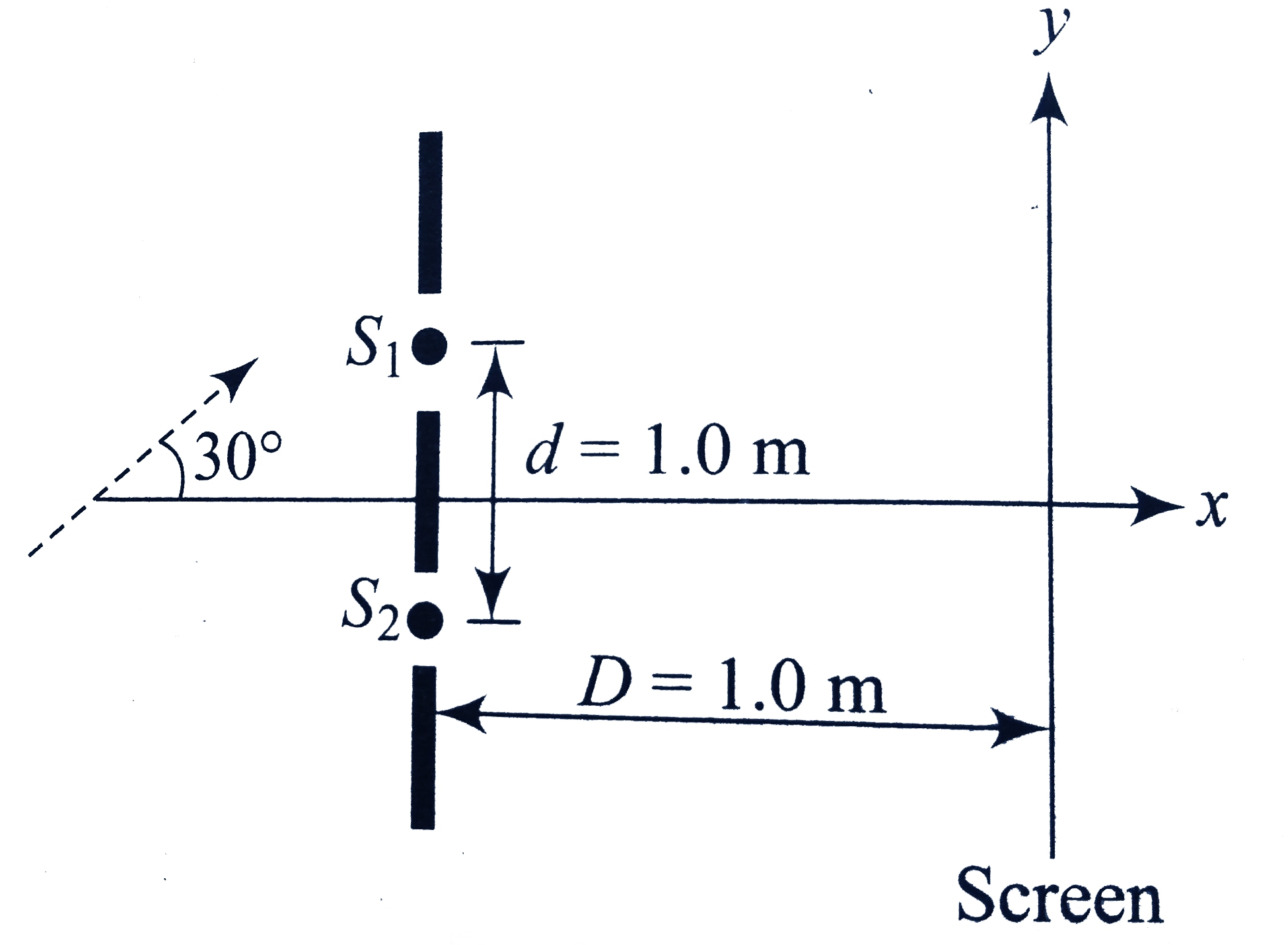
If the incient beam falls normally on the double-slit apparatus, find the order of the interference minima on the screenAOnly the first order minima are possibleBOnly the first order and second minima are possibleCTotal six minima appear on the screenDTotal eight minima appear on the screenIn Young's double slit experiment, white light is used. The seperation between the slits is kept 1mm and intensity is observed on screen distance 2m from the plane of the slits. At a point on the screen directly opposite to the either slit which of the following wavelength is not present
AultravioletBredCYellowDvioletLight of wavelength λ=5890Å fall on a double-slit arrangement having separation d=0.2mm. A thin lens of focal length f=1m is placed near the slits. The linear separation of fringes on a screen placed in the focal plane of the lens is
A3 mmB4 mmC2 mmD1 mm
A parallel beam of monochromatic light of wacelength λ used in a Young's double slit experiment. The siits are separated by a distance d and the screen is placed parallel to the plane of the slits. The incident beam makes an angle θ=sin−1(λ2d) with the normal to the slits. A transparent sheet of refractive index 'μ' and thickness t=λ2(μ−1) is introduced infront of one of the slit. find the intensity at the geometrical centre.
View SolutionIn Young's double slit experiment, the distance between the two slits is 0.1mm and the wavelength of light used is 4×10−7m. If the width of the fringe on the screen is 4 mm , the distance between screen and slit is
View SolutionWhite light of wavelength in range 400 nm to 700 nm is incident normaly on a young's double slit experiment apparatus. The distance betweenn slits is d=1 mm and distance between plane of the slits and screen in 0.8 m. At a point on the screen just in front of one of the slits the missing wavelength is (are)
View SolutionA parallel beam of light of wavelength 600 nm is incident normally on a slit of width d. If the distance between the slits and the screen is 0.8 m and the distance of 2nd order maximum from the centre of the screen is 15 mm. The width of the slit is
View SolutionThe Young's double slit experiment the wavelength of light λ=4×10−7m and separation between the slits is d=0.1mm. If the frintge width is 4mm then the seperation between the slits and the screen will be
View Solution
